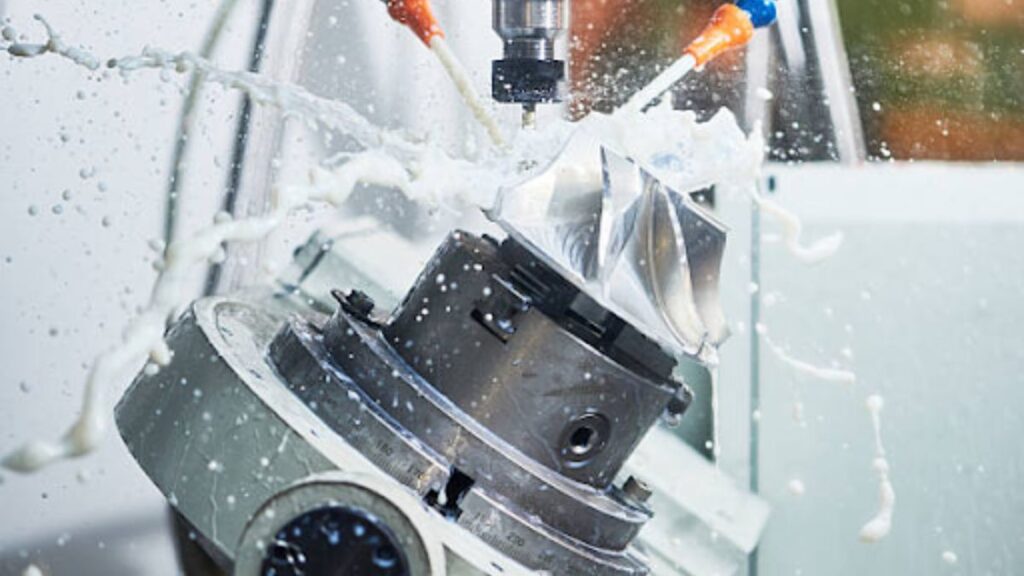Advanced manufacturing makes Precision CNC Turning a necessity. As makers of products introduce complexity and miniaturization, machining service business providers have evolved to become ultra-accurate component manufacturers. For B2B companies in aerospace, medical, optics, or the electronics industry, ultra-precision putting tolerances of ±0.001mm matters.
What Is Precision CNC Turning?
CNC (Computer Numerical Control) turning is a subtractive form of machining where a cutting tool traverses a rotating workpiece to remove material and create exact geometrical shapes, including cylindrical and conical outlines. Precision CNC Turning is able to hold tolerances of ±0.001mm due to the combination of ultra-fine precision controls, specialized tooling technologies, and environmental conditioning.
Such precision is important when shaping aerospace shafts, surgical implants, or optical connectors. These components require tight tolerances for compatibility, safety, and reliable performance, especially when operated under stringent conditions.
It is now deemed essential to integrate precision machining service providers within high-specification supply chains.
Sub-Micron Precision Technology
Achieving sub-micron tolerances goes beyond having a capable machine. It requires an entire ecosystem of technologies and process controls functioning in harmony with extreme rigor. Here are the details:
CNC Lathes
Sub-micron CNC turning centers have modern closed-loop control systems with rigid machine structures, granite bases for thermal stability, and direct-drive spindles that minimize vibration and backlash. For motion control, these machines are often equipped with linear motors, high-resolution encoders, and even directly coupled servos or motors.
Tooling and Workholding
Precision control requires equally precise workholding. Tools include single-crystal diamond and ultra-hard carbide inserts, which are more expensive but yield better durability and finishing. Workholding solutions include air chucks or hydrostatic clamps that hold the part securely without changing its shape.
In-Process Measurement
The most advanced CNC turning centers have probing systems that automatically measure parts mid-process and provide feedback. Live adjustments are made to ensure tight tolerances are maintained.
Thermal Management
Environmental conditions are closely monitored. Even a 1°C change in temperature can expand or contract something that is micrometer level precision. For this reason, shops operate from climate controlled rooms and use coolant systems equipped with temperature sensors.
Why ±0.001mm Tolerance Matters in B2B Industries
For most B2B stakeholders, the pursuit of accuracy beyond a sub-micron level isn’t motivated by design appeal or a new trend, but by functionality, safety, and compliance. Here’s the impact of ultra-tight tolerances per sector:
Aerospace: Zero Room for Error
In aerospace applications, components with any slight deviations in dimensions are guaranteed to cause misalignments, vibrations, and even fatigue of the components. Precision CNC turning and sub-micron accuracies enable the production of critical bushings, shafts, and actuator components that need extreme precision and safely endure harsh pressures and temperatures.
Medical Devices: Ensuring Biocompatibility and Fit
Implants and surgical instruments need to operate mechanically and pass rigorous biocompatibility and dimensional tests. Bone screws and catheter housings manufactured with tolerances of ±0.001mm greatly reduce surgical risks and improve outcomes by precise fitting.
Electronics and Optics: The Driving Force Behind Miniaturization
As devices become smaller, the room for assembly error vanishes. Connectors, sensor housings, and lens fixtures manufactured through precision machining service require functional and align functional alignment to work expertly.
How Precision CNC Turning Improves Product Life Cycle and Quality
The reputation of a provider who offers precision CNC turning services is not built solely on the part’s geometry. Their lifecycle value also matters. Here is how turning at a micron level boosts life and performance of components:
Enhanced Surface Finish
Achieved through high accuracy, precision enhances the surface quality of products which reduces friction, wear and corrosion. This sustains the component’s life.
Batch Consistency
Consistency is crucial for OEMs and Tier 1 suppliers. Top-notch precision machining service providers manufacture thousands of units while preserving quality of parts resulting in identical components across all batches.
Versatile Materials
Advanced cnc turning works with a variety of materials including stainless steel, titanium, engineering plastics and even ceramics. Each of these materials needs specific speed, feed, and tooling to maintain micron level tolerances which are considered unmatchable.
What to Consider While Choosing a Precision Machining Partner
Not every shop offering CNC turning services can work to sub-micron accuracy. If your business requires absolute precision, ensure that your supplier offers:
- High-Precision Equipment: Choose micromachining-specific devices as opposed to multifunctional ones.
- Experience with Your Industry: Proficiency with certain sectors such as aerospace or medical enhances design-for-manufacturing advice.
- Documentation and QA Systems: Displaying ISO certifications, inspection reports, and full traceability proves that they are committed to quality.
- Engineering Support: A collaborative partner helps in optimizing the part for performance while ensuring easy manufacturability.
- Environmental Controls: Inquire if they operate under temperature and humidity-controlled conditions which help in combating dimension changes of parts.
Why Investing In Micron-Grade Turning Makes Business Sense
Apart from the engineering perspective, from a business standpoint, investing in ultra-precise machining makes sense because of the following reasons:
- Reduced Waste: With tighter tolerances, less rejected parts are produced resulting in less waste.
- Lower Assembly Costs: Components that are perfectly fitting reduce installation time, thereby increasing overall assembly efficiency.
- Brand Trust: Ultra precise machining enhances brand reputation especially in highly regulated markets.
- Competitive Advantage: With tighter specs, products are more likely to outperform competition, enabling the use of premium pricing.
Conclusion: Precision Is the New Standard
In any industry today, as the trend of component miniaturization, automation, and system integration continues, companies can no longer view precision as a bonus. With up to ±0.001mm tolerances, precision CNC turning makes it possible for companies to manufacture products which can be much safer, smarter, and reliable.
From the point of view of the B2B decision-maker, associating with a trusted precision machining service provider not only benefits the organization in terms of accuracy, but also offers peace of mind regarding the supply chain, customer satisfaction metrics, and compliance with regulations.
Your project may require stringent engineering requirements and tight tolerances. If so, general machining cannot fulfill those needs, and now is the time to shift to sub-micron turning specialists.







